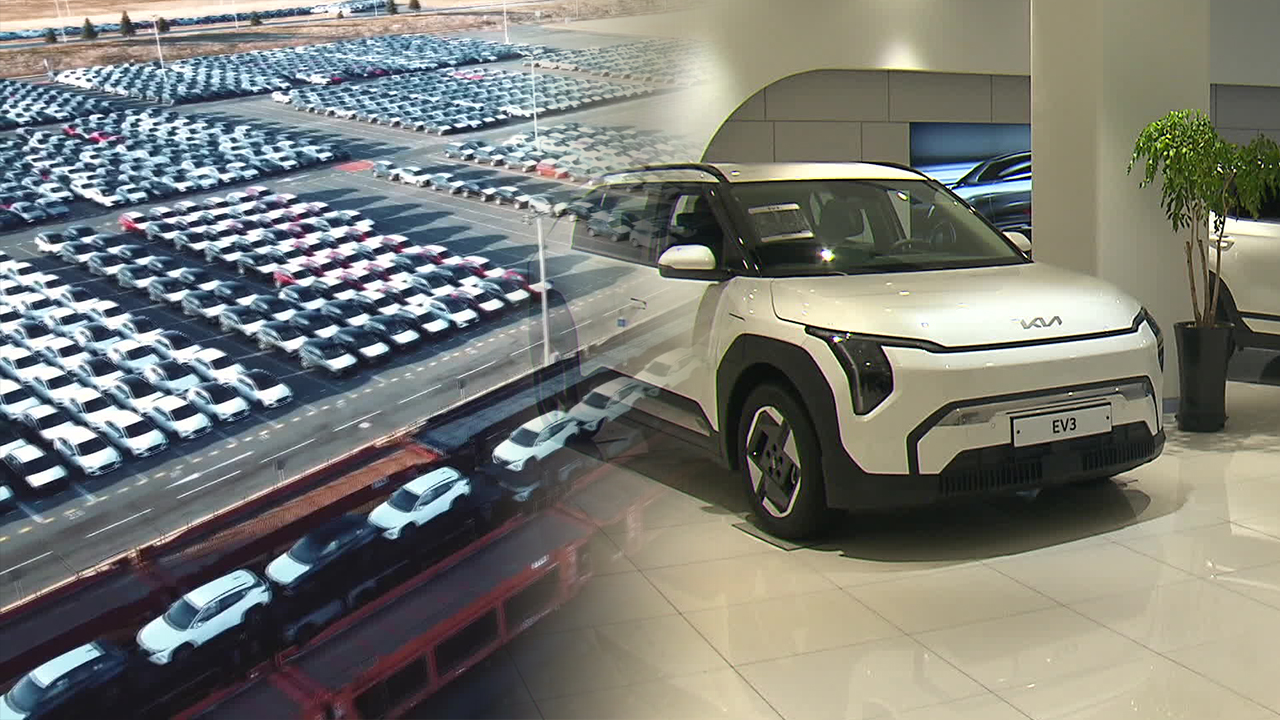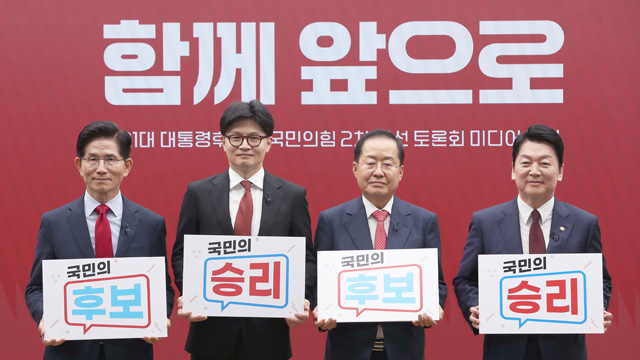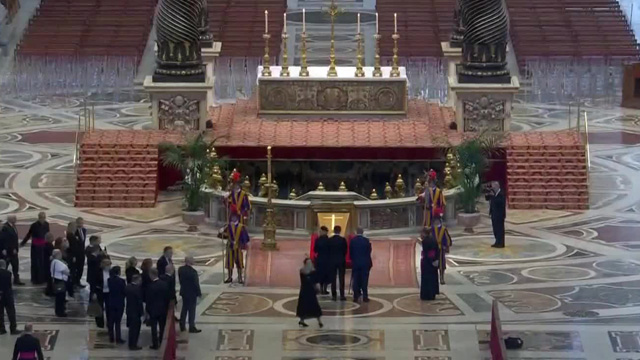Government to go all-in in first half to boost economy
입력 2025.01.02 (23:58)
읽어주기 기능은 크롬기반의
브라우저에서만 사용하실 수 있습니다.
[Anchor]
Even if income increases by 100 won, if prices rise by 100 won, household finances remain unchanged.
It seems that the Korean economy will be similar this year.
Both the inflation rate and economic growth rate are projected to be 1.8%.
It is fortunate that inflation is somewhat under control, but growth in the 1% range is concerning.
Let's look at the recent growth rates in reverse chronological order.
The trend of a steadily declining growth rate is clearly evident.
What is more noteworthy is that the potential growth rate has fallen below 2% again after two years.
This indicates that there is an issue of stagnation somewhere in the economy.
However, even the 1.8% growth is based on optimistic assumptions.
It is assumed that international oil prices are 9% lower than last year, and that domestic demand will improve compared to last year.
To ensure that these assumptions do not go awry, the government has prepared a strategy called 'All-in for the first half'.
Reporter Kim Hye-joo has the details.
[Report]
I received a consultation for purchasing an electric vehicle.
There were plenty of explanations about models and features.
However, they advised to postpone the purchase a bit.
[Ji Yong-tae/Automobile Sales Broker: "Currently, there are no subsidy benefits. Once the central and local governments announce those (subsidies), it would be more advantageous to purchase after benefiting from them."]
January and February are known for a sharp decline in electric vehicle sales.
This is because the electric vehicle purchase subsidies are confirmed around early March, but this year, payments will start in the third week of January.
The youth job incentive will be advanced by about a week and will start from tomorrow (1.3), while the elderly job benefits that were paid at the end of February last year will start at the end of this month, and support loans for small businesses will also begin in the third week of this month.
It is a 'race against time' to spend the budget as quickly as possible.
[Kim Jae-hoon/Director of Economic Policy, Ministry of Economy and Finance: "By rapidly executing the largest early budget spending in history during the first half of the year, we aim to generate an additional economic boost of 5 trillion won or more compared to last year."]
The reduction of the individual consumption tax, a staple strategy for promoting consumption, will also resume after a year and a half.
The individual consumption tax rate will be temporarily reduced from 5% to 3.5% in the first half of the year.
For a 40 million won passenger car, the tax will be reduced by about 700,000 won.
The government aims to spend 67% of this year's total budget in the first half.
On the first working day of the new year today (1.2), they even released an unusual press release stating that they executed over 330 billion won, which is 2.5 times last year's amount.
This is KBS News, Kim Hye-joo.
Even if income increases by 100 won, if prices rise by 100 won, household finances remain unchanged.
It seems that the Korean economy will be similar this year.
Both the inflation rate and economic growth rate are projected to be 1.8%.
It is fortunate that inflation is somewhat under control, but growth in the 1% range is concerning.
Let's look at the recent growth rates in reverse chronological order.
The trend of a steadily declining growth rate is clearly evident.
What is more noteworthy is that the potential growth rate has fallen below 2% again after two years.
This indicates that there is an issue of stagnation somewhere in the economy.
However, even the 1.8% growth is based on optimistic assumptions.
It is assumed that international oil prices are 9% lower than last year, and that domestic demand will improve compared to last year.
To ensure that these assumptions do not go awry, the government has prepared a strategy called 'All-in for the first half'.
Reporter Kim Hye-joo has the details.
[Report]
I received a consultation for purchasing an electric vehicle.
There were plenty of explanations about models and features.
However, they advised to postpone the purchase a bit.
[Ji Yong-tae/Automobile Sales Broker: "Currently, there are no subsidy benefits. Once the central and local governments announce those (subsidies), it would be more advantageous to purchase after benefiting from them."]
January and February are known for a sharp decline in electric vehicle sales.
This is because the electric vehicle purchase subsidies are confirmed around early March, but this year, payments will start in the third week of January.
The youth job incentive will be advanced by about a week and will start from tomorrow (1.3), while the elderly job benefits that were paid at the end of February last year will start at the end of this month, and support loans for small businesses will also begin in the third week of this month.
It is a 'race against time' to spend the budget as quickly as possible.
[Kim Jae-hoon/Director of Economic Policy, Ministry of Economy and Finance: "By rapidly executing the largest early budget spending in history during the first half of the year, we aim to generate an additional economic boost of 5 trillion won or more compared to last year."]
The reduction of the individual consumption tax, a staple strategy for promoting consumption, will also resume after a year and a half.
The individual consumption tax rate will be temporarily reduced from 5% to 3.5% in the first half of the year.
For a 40 million won passenger car, the tax will be reduced by about 700,000 won.
The government aims to spend 67% of this year's total budget in the first half.
On the first working day of the new year today (1.2), they even released an unusual press release stating that they executed over 330 billion won, which is 2.5 times last year's amount.
This is KBS News, Kim Hye-joo.
■ 제보하기
▷ 카카오톡 : 'KBS제보' 검색, 채널 추가
▷ 전화 : 02-781-1234, 4444
▷ 이메일 : kbs1234@kbs.co.kr
▷ 유튜브, 네이버, 카카오에서도 KBS뉴스를 구독해주세요!
- Government to go all-in in first half to boost economy
-
- 입력 2025-01-02 23:58:14

[Anchor]
Even if income increases by 100 won, if prices rise by 100 won, household finances remain unchanged.
It seems that the Korean economy will be similar this year.
Both the inflation rate and economic growth rate are projected to be 1.8%.
It is fortunate that inflation is somewhat under control, but growth in the 1% range is concerning.
Let's look at the recent growth rates in reverse chronological order.
The trend of a steadily declining growth rate is clearly evident.
What is more noteworthy is that the potential growth rate has fallen below 2% again after two years.
This indicates that there is an issue of stagnation somewhere in the economy.
However, even the 1.8% growth is based on optimistic assumptions.
It is assumed that international oil prices are 9% lower than last year, and that domestic demand will improve compared to last year.
To ensure that these assumptions do not go awry, the government has prepared a strategy called 'All-in for the first half'.
Reporter Kim Hye-joo has the details.
[Report]
I received a consultation for purchasing an electric vehicle.
There were plenty of explanations about models and features.
However, they advised to postpone the purchase a bit.
[Ji Yong-tae/Automobile Sales Broker: "Currently, there are no subsidy benefits. Once the central and local governments announce those (subsidies), it would be more advantageous to purchase after benefiting from them."]
January and February are known for a sharp decline in electric vehicle sales.
This is because the electric vehicle purchase subsidies are confirmed around early March, but this year, payments will start in the third week of January.
The youth job incentive will be advanced by about a week and will start from tomorrow (1.3), while the elderly job benefits that were paid at the end of February last year will start at the end of this month, and support loans for small businesses will also begin in the third week of this month.
It is a 'race against time' to spend the budget as quickly as possible.
[Kim Jae-hoon/Director of Economic Policy, Ministry of Economy and Finance: "By rapidly executing the largest early budget spending in history during the first half of the year, we aim to generate an additional economic boost of 5 trillion won or more compared to last year."]
The reduction of the individual consumption tax, a staple strategy for promoting consumption, will also resume after a year and a half.
The individual consumption tax rate will be temporarily reduced from 5% to 3.5% in the first half of the year.
For a 40 million won passenger car, the tax will be reduced by about 700,000 won.
The government aims to spend 67% of this year's total budget in the first half.
On the first working day of the new year today (1.2), they even released an unusual press release stating that they executed over 330 billion won, which is 2.5 times last year's amount.
This is KBS News, Kim Hye-joo.
Even if income increases by 100 won, if prices rise by 100 won, household finances remain unchanged.
It seems that the Korean economy will be similar this year.
Both the inflation rate and economic growth rate are projected to be 1.8%.
It is fortunate that inflation is somewhat under control, but growth in the 1% range is concerning.
Let's look at the recent growth rates in reverse chronological order.
The trend of a steadily declining growth rate is clearly evident.
What is more noteworthy is that the potential growth rate has fallen below 2% again after two years.
This indicates that there is an issue of stagnation somewhere in the economy.
However, even the 1.8% growth is based on optimistic assumptions.
It is assumed that international oil prices are 9% lower than last year, and that domestic demand will improve compared to last year.
To ensure that these assumptions do not go awry, the government has prepared a strategy called 'All-in for the first half'.
Reporter Kim Hye-joo has the details.
[Report]
I received a consultation for purchasing an electric vehicle.
There were plenty of explanations about models and features.
However, they advised to postpone the purchase a bit.
[Ji Yong-tae/Automobile Sales Broker: "Currently, there are no subsidy benefits. Once the central and local governments announce those (subsidies), it would be more advantageous to purchase after benefiting from them."]
January and February are known for a sharp decline in electric vehicle sales.
This is because the electric vehicle purchase subsidies are confirmed around early March, but this year, payments will start in the third week of January.
The youth job incentive will be advanced by about a week and will start from tomorrow (1.3), while the elderly job benefits that were paid at the end of February last year will start at the end of this month, and support loans for small businesses will also begin in the third week of this month.
It is a 'race against time' to spend the budget as quickly as possible.
[Kim Jae-hoon/Director of Economic Policy, Ministry of Economy and Finance: "By rapidly executing the largest early budget spending in history during the first half of the year, we aim to generate an additional economic boost of 5 trillion won or more compared to last year."]
The reduction of the individual consumption tax, a staple strategy for promoting consumption, will also resume after a year and a half.
The individual consumption tax rate will be temporarily reduced from 5% to 3.5% in the first half of the year.
For a 40 million won passenger car, the tax will be reduced by about 700,000 won.
The government aims to spend 67% of this year's total budget in the first half.
On the first working day of the new year today (1.2), they even released an unusual press release stating that they executed over 330 billion won, which is 2.5 times last year's amount.
This is KBS News, Kim Hye-joo.
-
-

김혜주 기자 khj@kbs.co.kr
김혜주 기자의 기사 모음
-
이 기사가 좋으셨다면
-
좋아요
0
-
응원해요
0
-
후속 원해요
0










![[속보] 민주당 호남 경선, 이재명 88.69%, <br>김경수 3.9%, 김동연 7.41%](/data/layer/904/2025/04/20250426_A8AzXV.jpg)
![[속보] 인제 산불 대응 ‘산불 2단계’로 격상…강풍으로 진화에 어려움](/data/layer/904/2025/04/20250426_NQU6sZ.jpg)



이 기사에 대한 의견을 남겨주세요.